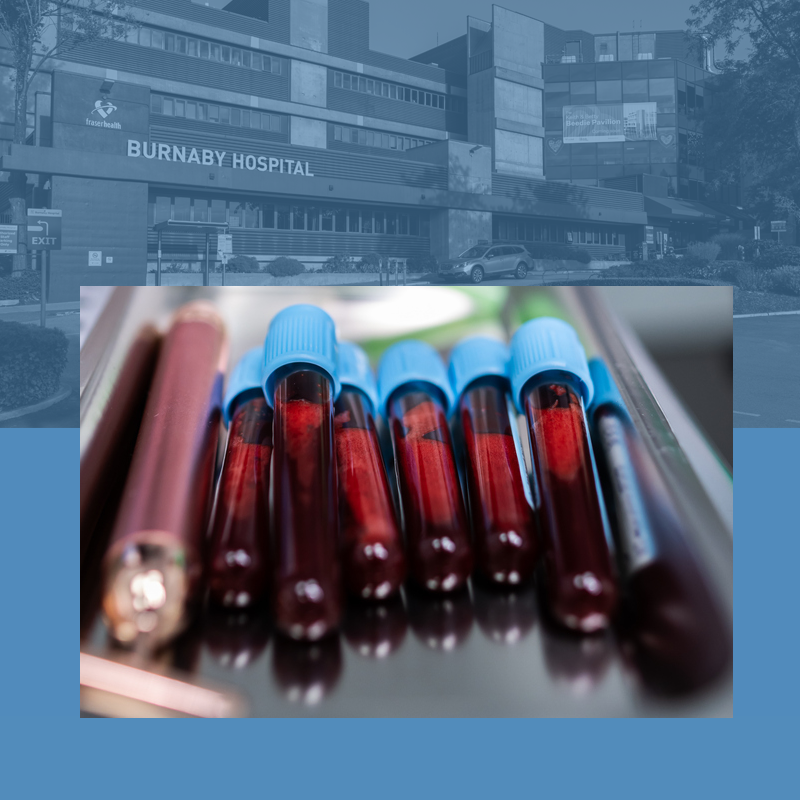 A team of physicians at Burnaby Hospital has shown how collaborative partnerships can enhance care quality and reduce system costs by minimizing unnecessary patient blood tests.
A team of physicians at Burnaby Hospital has shown how collaborative partnerships can enhance care quality and reduce system costs by minimizing unnecessary patient blood tests.
In 2022 and 2023, anesthesiologists Dr Emma Harris and Dr Andy Lo co-led a “Stop the Routine” project with Orthopedic Surgeon Lead Dr Tim Kostamo, with a goal to reduce unnecessary G&S testing.
Dr Sarah Ostler and Janice Eng further supported the project with coaching in quality improvement (QI) methodology.
Previously, all patients undergoing total knee and hip surgeries at Burnaby Hospital were required to have a routine group and screen (G&S) blood test prior to their surgery to ensure a compatible blood match for transfusions, if needed.
Advancements in surgical and anesthetic techniques mean that G&S is no longer advised for elective procedures in low-risk patients.
The tests can result in excessive blood draws, potential lab errors, increased staff time, and higher lab costs. Optimizing blood management not only conserves resources but also improves patient experience and quality.
Physician participation in the project was funded by the Burnaby Hospital Medical Staff Association and Facility Engagement – an initiative of the Specialist Services Committee, a joint collaborative committee of Doctors of BC and the Government of BC.
Engaging clinical and data support staff
The group first collaborated with pre-admission clinic staff to map out the G&S testing process and identify opportunities for workflow improvements.
Together, they developed a screening tool for the clinic. It allowed staff to identify higher-risk patients who would still require a pre-operative G&S test, while eliminating mandatory screening from the pre-admission checklist for low-risk patients.
As a key project success factor, Fraser Health provided access to Electronic Health Record (EHR) data, which supported vital evidence that reductions in G&S testing had no negative impact on care quality and would not negatively affect patient outcomes. The data gave physicians the confidence to support the changes.
Once implemented, other affected health care providers were educated about the changes in protocol to prevent potential surgical delays.
Results: elimination of unnecessary tests, cost savings
Between May 2022 and April 2023, the number of G&S tests performed before total knee and hip arthroplasty surgeries were significantly reduced.
A control chart illustrates a reduction in the number of group and screen orders from a rate of 118.4 to 13.2 per 100 THA/TKA, with inappropriate G&S tests virtually eliminated.
This change, sustained in the last year, creates an estimated health system cost savings of about $15,000 for every 1000 procedures performed.
Empowering physicians to lead clinical improvements that challenge and transform traditional practices can have a positive affect on both patient experience, staff and physician time, and health care system burden.
“As the needs of our population change and health care gets more and more complex, it’s important for physicians to have an opportunity to lead changes and feel empowered to challenge the status quo,” says Dr Emma Harris.
“We need to be supported in order to come up with creative and innovative ways to improve the system’s efficiency.”
“The benefit for patients is having less blood taken and less risk of error with unnecessary testing. The benefit for physicians is having a hospital system that functions as efficiently as possible, freeing up lab time and resources for clinically indicated tests.” – Dr. Emma Harris
Interested in connecting with this project? Contact engagement@doctorsofbc.ca



